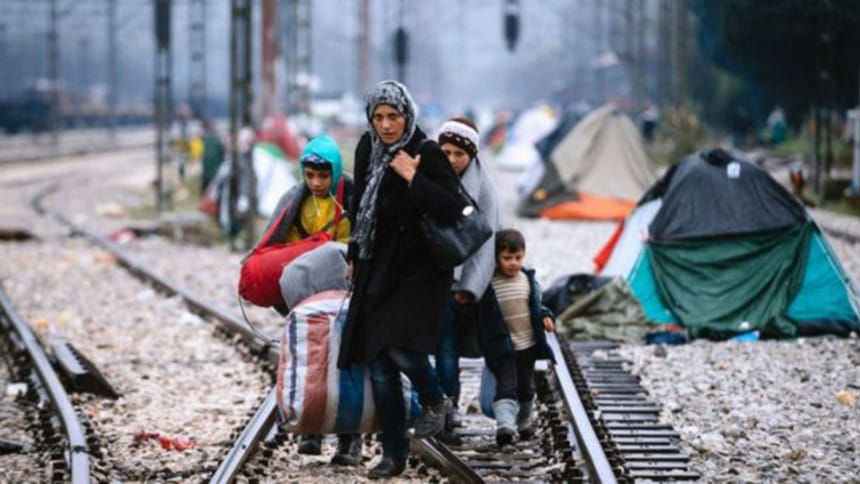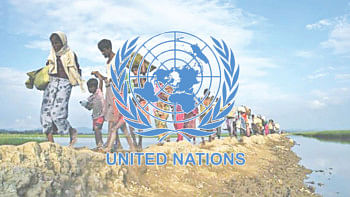Merkel condemns migrant route closure

German Chancellor Angela Merkel has blamed European nations for "unilaterally" shutting the Balkan route for migrants.
She said this had put Greece in a "very difficult situation" and such decisions should be taken by the whole of the EU.
Austria, Slovenia, Croatia, and non-EU members Serbia and Macedonia have all acted to stem the migrant flow.
The EU and Turkey, from where migrants reach Greece, have set out a plan to ease the crisis.
Under the proposals, hammered out at a summit in Brussels on Monday but still to be finalised, all migrants arriving in Greece from Turkey would be sent back. For each Syrian returned, a Syrian in Turkey would be resettled in the EU.
European Council President Donald Tusk has said the plan would spell the end of "irregular migration to Europe".
It is the worst such crisis in Europe since World War Two.
The move to close the Balkan route began with Austria announcing it would limit the number of migrants crossing its border.
Then, late on Tuesday, Slovenia said it would allow in only migrants who planned to seek asylum in the country, or those with clear humanitarian needs.
Serbia and Croatia quickly announced similar border restrictions. Then on Wednesday, Macedonia, which had slowed the number of migrants crossing its border with Greece to a trickle, shut it completely.
Some 14,000 migrants are now left stranded in a sprawling tent camp at the Idomeni crossing.
A draft statement from the Brussels summit had declared the Balkan route "closed". But Germany objected to the wording and it was changed.
Merkel said at the time that declaring the closure was wrong.
Speaking to MDR radio on Thursday, she repeated her position, saying that closing the route "does not resolve the problem" and would "not be sustainable or lasting".
She said: "Personally I think that Austria's unilateral decision, and then those made subsequently by Balkan countries, will obviously bring us fewer refugees, but they put Greece in a very difficult situation.
"If we do not manage to reach a deal with Turkey, then Greece cannot bear the weight for long.
"That's why I am seeking a real European solution, that is, a solution for all 28 [EU members]," she said.
However, Austria on Thursday insisted the closure of the Balkan route was "permanent". Interior Minister Johanna Mikl-Leitner said only a "consistent signal" would deter people from seeking asylum in Europe.
The EU-Turkey deal is far from certain to be adopted. Talks will continue ahead of an EU meeting on 17-18 March.
On Thursday, Turkey insisted the one-in, one-out deal for Syrian migrants would not apply to those already in Greece.
The deal also raises legal questions. Thorbjorn Jagland, Secretary General of the Council of Europe, told the BBC the proposal to send migrants back would contravene international law.
More than a million migrants and refugees crossed into Europe in 2015.
Germany itself had more than 476,000 asylum applications last year but officials there believe more than a million migrants, from all countries, are in its system for counting and distributing people before they make claims.
What's in the EU-Turkey proposal?
The EU heads said "bold moves" were needed, and made the following proposals:
All new irregular migrants crossing from Turkey to Greece will be returned to Turkey. Irregular migrants means all those outside normal transit procedures, ie without documentation.
In exchange for every returned Syrian, one Syrian from Turkey will be resettled in the EU
Plans to ease access to the EU for Turkish citizens will be speeded up, with a view to allowing visa-free travel by June
EU payment of €3bn ($3.3bn; £2.2bn) promised in October will be speeded up, with the possibility of further aid to help Turkey deal with the crisis. Turkey reportedly asked for the sum to be doubled
Preparations will be made for opening new chapters in talks on EU membership for Turkey.

 For all latest news, follow The Daily Star's Google News channel.
For all latest news, follow The Daily Star's Google News channel. 








Comments